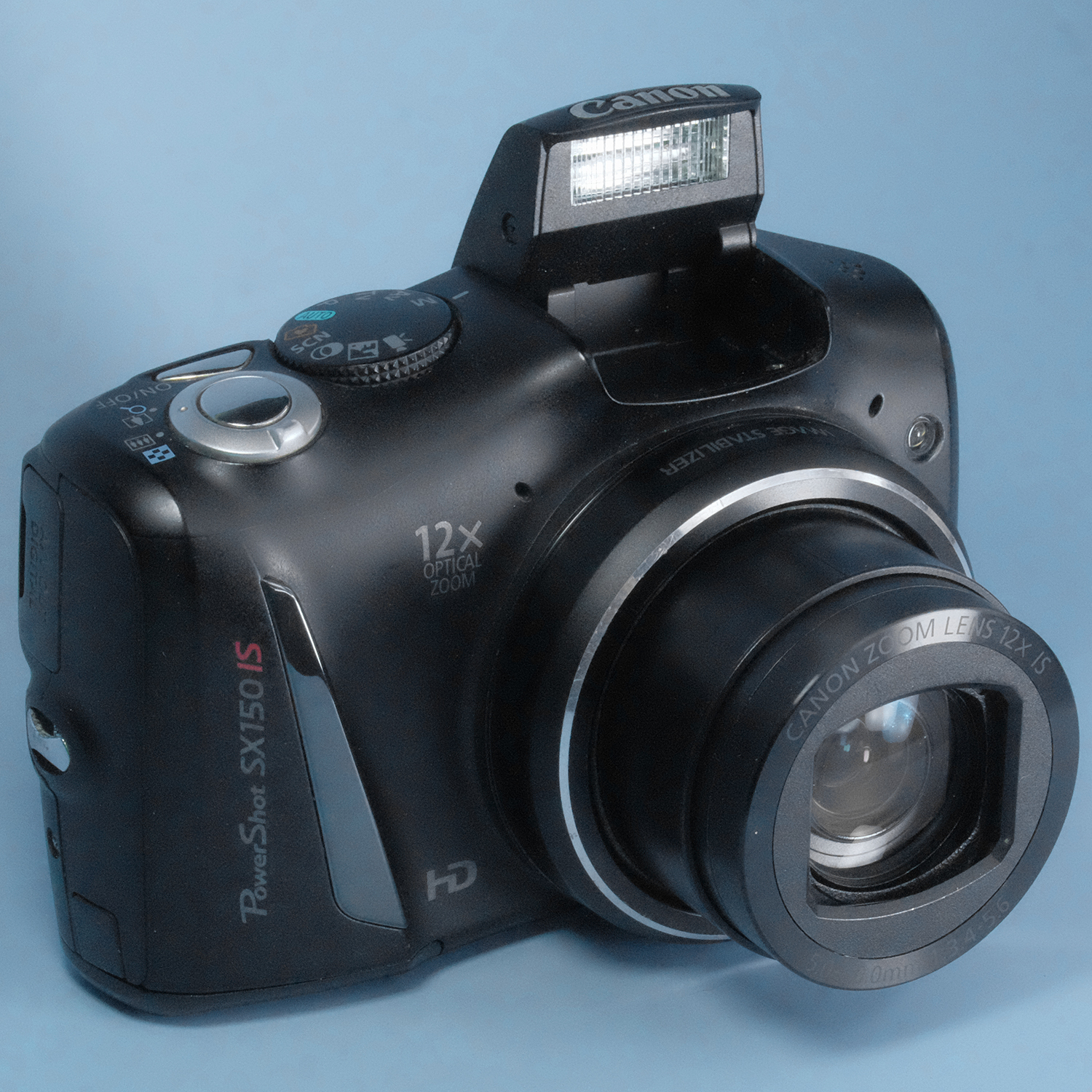 |
| Canon Powershot SX150 IS (2011 Bridge Camera) |
2020.09.25 - Published
2022.07.26 - Re-written and new photos
Canon Powershot SX150 IS
Released - September 2011
Resolution - 14.1 Megapixels
Sensor - 1/2.3" CCD
Processor - Canon DIGIC 4
Crop Factor - 5.6x
Focal Range (35mm Equivalent) - 25mm to 336mm
Zoom Type - 12x optical zoom, 4x digital zoom (total 48x zoom)
Image Stabilization - Lens shift, not digital
Max Aperture - f/3.4(W) to f/5.6(T)
Minimum Aperture - f/8
Optical Formula - ? elements, ? groups
ISO Sensitivity - 80-1600
Shutter Speeds - 1" - 1/2500"
Minimum Focusing - 5cm(W) to 1m(T)
Macro - 1cm(W) up to 7cm(T)
Stills Aspect Ratio - 4:3, 16:9
Power Source - 2x AA batteries
Dummy Adapter - ACK800+DRDC10
Made in Malaysia
Photo Album
https://photos.app.goo.gl/JgNfpbxcMVSP5FFv9
Impressions
NOTE TO READER: ALL THE FOCAL LENGTH I SPECIFY HERE IS THE CAMERA'S EQUIVALENT IN 35MM FILM OR FULL FRAME. FOR EXAMPLE, THIS CAMERA'S RANGE IS '5MM TO 60MM' BUT YOU WILL ALWAYS SEE ME WRITE '28MM TO 336MM' (THIS CAMERA HAS A CROP FACTOR OF 5.6X).
The Canon Powershot SX150 IS was released in September of 2011. This bridge camera is a great level up from mobile phone photography and from regular digicams for reasons that I will state below...
The focal range is equivalent to 28mm (wide angle) up to 336mm (telephoto), the 12x optical zoom which makes it an all-around camera. If that is not enough reach, there is an additional 4x digital zoom. 'Optical zoom' means that lens elements move to zoom from wide to telephoto; whereas 'digital zoom' merely crops the image, just as what mobile phones do, resulting in a fuzzy image. That is why it is recommended for digital zoom to be turned off. Optical zoom is the advantage that this camera and digicams have over mobile phones.
Minimum Focusing Distance. At 28mm (W), you can be as close as 1cm for macro shooting. The MFD increases as you zoom, and it is around 40cm by 70mm. Beyond that, is 1 meter. To get the most optimal macro shooting, I zoom the camera to 70mm (2.5x zoom) so that the MFD would be at 40cm and the image is beautiful magnified. I don't use macro at the wide end because too close to the subject results in distortion and blocking the light.

This Canon bridge camera uses a 1/2.3-inch CCD sensor, which is the same size used by compact digicams. This isn't a DSLR and you might be thinking it has a big sensor. The advantage is longer reach because of its zoom range. Images are beautifully rendered because of the multicoated lens elements and Canon processor. The colors are realistic and perfect straight out of the camera. This camera can get a perfect exposure without clipped highlights thanks to its processor (I saw this happen in three of my cheap digicams in the past).
You can get even more out of this camera if you can invest in cheap lighting (eg. pocket lighting or ring light, a regular home LED bulb, some diffusers/reflectors), although the pop-up flash is already sufficient on its own.
 |
| This was my midnight outdoor setup for the three shots below... |
Let's do a comparison...
I shot these from one meter,
mounted on a tripod
and using a ring light
These are all unedited/sooc
1) FUJI X-T10+Sony 18-55mm
(at 55mm f/8, approx. 0.5 meters)
It has a dedicated Video Mode, but the maximum resolution is only 1280x720/30. It was a good resolution for its time (early 2010s) but still good a decade later. Now in 2022, I shoot alot of videos in 720p and render them in 1080p. They are for YouTube viewing only, so I don't have a problem. While the camera has a Manual exposure mode, you can only film videos in Program AE mode -- ISO is fixed to Auto, and the shutter speed/f-stop are decided by dialing the exposure compensation.
Unlike my previous digicams which used digital stabilization, this Canon bridge camera uses optical stabilization (by shifting lens elements), giving a smoother look. The camera does not have a microphone input, but records in good stereo sound. The zooming is silent and won't be heard when you are recording.
This camera is lightweight and compact, it could fit in the pocket for convenience. The camera body has a beautiful ergonomic design and curved edges. It looks like a mini-DSLR, but unfortunately, you can only hook a lanyard or strap to the right side of the camera.
This camera is has full manual control of exposure and focusing. There are the P, S, A, M modes, but I always use Manual Exposure Mode. Focusing has three options: Normal AF, Macro AF, and Manual. Furthermore under the Menu list is an option for you to choose if the AF will focus on the Center, Face Detect, or Tracking; Single or Continuous AF.
The only weakness of this camera is that it runs on two AA batteries (later versions use lithium battery). The power will not be an issue if you don't shoot alot of video and it will last past an hour for shooting stills (I use 2,000 mAh rechargeable batteries). A dummy battery (ACK800+DRDC10) can be attached to a power bank or outlet so you can have infinite power supply.
Another issue also relates to the power supply. I read that the battery quickly drains in less than half an hour; it was a common issue. The cause of this is dirty contacts in the battery compartment. You need to clean those contacts with alcohol and cotton buds. Once it was cleaned, the power drain was never an issue again.
 |
| ACK800 + DR-DC10 (USB can connect to power bank) |
Final Thoughts
You might be wondering why I bought this Canon SX150... because 6 years before, I used to own a Canon SX510 and was missing that camera for a long time. It was my last camera before upgrading to a DSLR in 2015. Even though this camera was from 2011, it can still be a good camera by 2020s standard and definitely a big level up from using phone-cameras. It has full manual control of exposure and focusing and the image output is very good. You can easily get near-DSLR quality photos if you have good lighting techniques. But this tiny bridge camera is also tiny and pocketable, while giving you a great zoom range -- making it more convenient to travel with compared to bigger mirrorless and DSLRL cameras (of course, you can't beat the image quality of those systems!). You can easily find used cameras like these nowadays for as little as 3k Pesos, it's worth a try!
Shots with the Canon SX150
All photos were shot in
Manual Exposure Mode
(This is the look you get straight out of camera)
Close-ups of my eyelashes
at 28mm(W) macro AF
 |
| Macro at 28mm(W) |
Pictures of my cat, natural light
 |
| Only this was the edited/corrected. |
 |
| Wide angle macro (shot at closeup) |
 |
| Shot from 1 meter |
 |
| Shot from 1 meter Pay attention the highlights, hindi sabog! |
 |
| 70mm (2.5x zoom), 4cm distance |
 |
| 70mm (2.5x zoom), 4cm distance |
# # # E N D # # #































0 comments:
Post a Comment